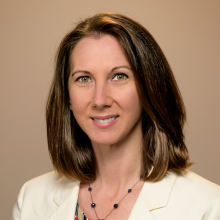July 2014 Spotlight on the SRCD Policy Fellow: Lynlee Tanner Stapleton, Ph.D.
2013-2014 Federal Executive Branch Policy Fellow
As a doctoral student in clinical psychology, I was often faced with the question: “Research or practice?” Yet from my first year of graduate school, I realized the answer was simultaneously “both and neither.” I knew early on that my passion lay in using policy and organizational solutions to address problems facing lower-income children and their communities AND that the SRCD Executive Branch Policy Fellowship would be a key target in fulfilling that vision.
What I did not foresee was that becoming a fellow would allow me to expand my vision to include promoting child development needs from a global vantage point. I am incredibly fortunate to be the first SRCD fellow to secure a placement at the U.S. Agency for International Development (USAID). As a part of the U.S. Global Development Lab (formerly the Office of Science and Technology), I have worked to develop and implement a project designed to reduce the number of children in select lowerincome countries who lack appropriate, protective, and permanent family-based care. The perspective that my office brings to these problems is one of promoting evidence-based programming and decisionmaking, using the latest advances in science and technology to solve challenging problems, and engaging a variety of partners and stakeholders in creating and enacting the solution(s).
Despite not having worked in international development previously, I found the position to be an interesting and exciting extension of my past experiences with low-income, disempowered, and often traumatized communities; child development within the context of family relationships; and crossdisciplinary, systemic approaches to promoting child well-being. I have also appreciated the ability to explore child development as one key component underpinning global development, as it encompasses many of the more traditional development sectors, such as health, education, and economic growth.
My primary duties have involved conducting in-depth desk research and interviews to define and clarify the problem we want to address, helping develop and refine the programmatic strategy and tools we will implement, working with other USAID offices and external partners to identify and secure resources for carrying out the project, and crafting written documents to communicate our work. I have also had the opportunity to visit in-country field offices (“missions”) to observe related, ongoing projects and better understand local needs. In addition, I have been able to meet with a variety of USAID staff, attend several brownbags and seminars, and join topical working groups and workshops to learn more about the many and diverse resources and activities of USAID and our partners.
In sum, the fellowship has offered me an incredible chance to learn about how the government translates strategic priorities into programmatic action and eventually develops and carries out programs to benefit vulnerable children and families. I look forward to extending my fellowship for a second year, in which I hope to develop deeper expertise in my current work as well as expand and apply my skills to new projects.
